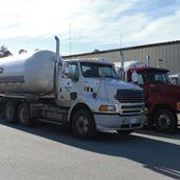
In recent years, many households have switched to propane furnaces to take advantage of their efficiency, low carbon footprint, and affordability. If you’re considering converting your heating to a propane system, you may have a number of questions about how it works and why it can benefit you. Find out more in the guide below.
What Is Propane?
Propane is a natural by-product of the process of refining oil and natural gas. Under normal atmospheric pressure and room temperature, it exists in a gaseous state. It’s typically pressurized in bottles during transportation and storage, which forces it into a liquid state, known as liquefied petroleum (LP) gas.
Propane is available in a range of grades, with the more refined HD-5 used to fuel residential furnaces. Propane tanks range in size from one-pound cylinders for camping stoves to tanks holding several tens of thousands of gallons. Most propane-heated homes have 500-gallon tanks.
What Are Propane Furnaces?

The primary difference between propane furnaces and similar systems is the use of propane instead of oil or natural gas. To heat a building, propane is ignited in a burner, with the resulting flames heating a heat exchanger which then transfers heat to incoming air. The heated air is then distributed through ducts to separate rooms and cold air is drawn into the intake to continue the process.
With annual maintenance, a propane heating system will last up to 30 years, or even 40 in some cases. During that time, you can lower the environmental impact of your heating, as propane emits significantly less carbon than traditional coal or petroleum. Furthermore, propane is one of the safest fuels available, since it won’t ignite or combust unless the surrounding air is at a temperature between 920 and 1020 °F.
If you’re ready to make the switch to a propane furnace before winter arrives, contact Superior Gas in Roanoke, AL. Serving East Central Alabama and Panama City, FL, since 1948, they offer an extensive selection of propane tanks and heating appliances. Their skilled technicians provide year-round fuel deliveries and dependable maintenance and repairs. Call their main office at (334) 863-2138 to discuss your needs, and visit their website for more information on their services.
About the Business
(5 reviews)
Have a question? Ask the experts!
Send your question

